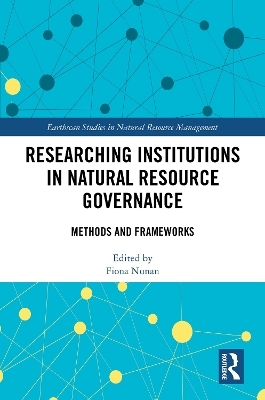
Researching Institutions in Natural Resource Governance
Routledge (Verlag)
978-1-032-62466-2 (ISBN)
- Lieferbar (Termin unbekannt)
- Versandkostenfrei
- Auch auf Rechnung
- Artikel merken
This book presents an overview of different data collection methods and approaches that have been used to identify and analyse institutions associated with natural resource governance.
Institutions as rules of the game are fundamental to the management, governance and use of renewable natural resources, such as fisheries, forests and water. Yet researching institutions, particularly informal institutions, can be challenging as they can be difficult to identify, investigate and understand. This volume tackles this challenge head on. The innovative collection brings together contributions from different disciplines and traditions reporting and reflecting on a range of qualitative and quantitative research methods and experiences. The book begins by reviewing definitions and typologies of institutions and introduces different approaches to researching institutions in natural resource governance, namely the Bloomington School, associated with Elinor Ostrom, and Critical Institutionalism. Following this, each chapter provides an overview and example of application of research approaches and methods, including mixed methods, institutional grammar, fuzzy cognitive mapping, network analysis, assemblage and ethnography. The concluding chapter identifies key insights into institutions and lessons on researching institutions. From these, the chapter provides a set of observations on researching institutions in natural resource governance, with the aim of providing guidance for new and experienced researchers.
The volume provides an essential introduction for students and researchers into the range of methods and approaches, and their practical application, that can be used to research institutions associated with natural resource governance.
Fiona Nunan is Professor of Environment and Development in the International Development Department at the University of Birmingham, UK. She is the author of Understanding Poverty and the Environment (Routledge, 2015), editor of Governing Renewable Natural Resources (Routledge, 2020) and lead editor of The Routledge Handbook on Livelihoods in the Global South (Routledge, 2022).
1. Introduction 2. Using the Institutional Analysis and Development (IAD) Framework to link collective action, behavioural change, and social-environmental outcomes in conservation policy 3. Measuring institutions in quantitative field research 4. Institutional Complexity in Linked Socio-Ecological Systems - An Approach to Studying Multi-Level, Cross-Scalar Contexts 5. Navigating rules of the range: Focusing on relationality and process in Kenya and China 6. Deconstructing local institutions in forest landscape: an ethnographic case study from India 7. Researching institutional bricolage 8. Staying with the trouble: Experimenting with a socio-technical approach to researching water governance 9. Assembling natural resource governance 10. Diagnosing landscape governance using network analysis: practical considerations for research and decision-making 11. Conclusion
| Erscheinungsdatum | 21.11.2024 |
|---|---|
| Reihe/Serie | Earthscan Studies in Natural Resource Management |
| Zusatzinfo | 9 Tables, black and white; 15 Line drawings, black and white; 3 Halftones, black and white; 18 Illustrations, black and white |
| Verlagsort | London |
| Sprache | englisch |
| Maße | 156 x 234 mm |
| Gewicht | 610 g |
| Themenwelt | Naturwissenschaften ► Biologie ► Ökologie / Naturschutz |
| Technik ► Umwelttechnik / Biotechnologie | |
| Weitere Fachgebiete ► Land- / Forstwirtschaft / Fischerei | |
| ISBN-10 | 1-032-62466-3 / 1032624663 |
| ISBN-13 | 978-1-032-62466-2 / 9781032624662 |
| Zustand | Neuware |
| Haben Sie eine Frage zum Produkt? |
aus dem Bereich


